“If you think your addiction to synths and studio gear is out of control, imagine being in Depeche Mode”: We'd forgotten quite how much of the band's gear Alan Wilder shifted in his legendary auction, and just how many bargains were up for grabs
An Oberheim and Minimoog went for a song, but it was a Martin Gore guitar and E-mu sampler that stole the show
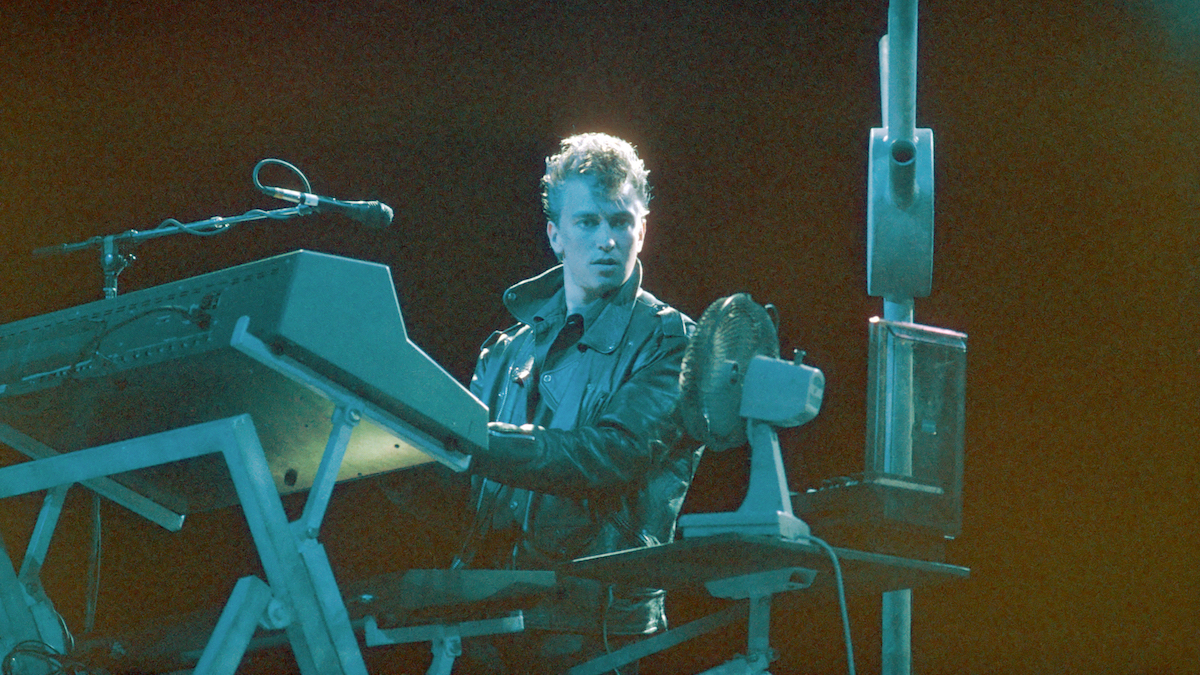
In 2011, Alan Wilder had long since left Depeche Mode where he'd helped define their sound for more than a decade. He then found himself with more gear than he knew what to do with, so he decided to sell a few prized possessions.
But what started out as a select few items turned into one of the biggest sales of music gear and memorabilia in recent memory…
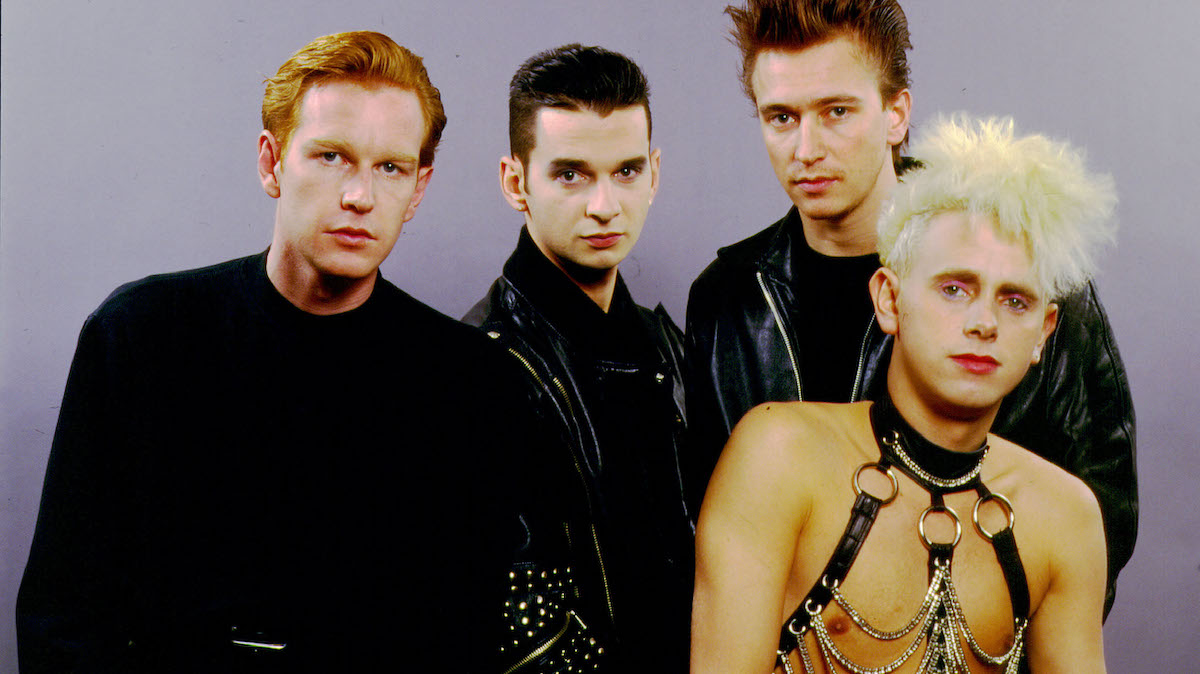
Alan Wilder was with Depeche Mode from 1982 to 1995, arguably the band’s most creative phase, but most definitely the period when they went from teen synth poppers to world dominating synth rockers.
Much of the playing fell on Wilder’s shoulders, as he was the only musically trained member of the band
When Wilder joined the band, it’s fair to say that Andrew Fletcher and Martin Gore handled some synth duties, but as Gore tackled more of the band’s songwriting, much of that playing fell on Wilder’s shoulders, as he was the only musically trained member of the band.
Wilder’s input in Depeche Mode then increased from effectively being a session player at the start, to being an occasional songwriter, and then working with Flood, helping to produce the band’s greatest albums, Violator and Songs of Faith And Devotion.
Indeed Wilder is famously cited as the man who turned Martin Gore’s rather more laid-back version of Enjoy The Silence into the worldwide upbeat electronic pop hit that opened so many doors for the band across the world.
With Wilder entrenched in the studio side of Depeche Mode during his years with the band, it was no surprise that he would end up collecting a large amount of studio gear – this is a band known for its use of cutting edge technology, after all.
Want all the hottest music and gear news, reviews, deals, features and more, direct to your inbox? Sign up here.
If you think your addiction to synths and studio gear is out of control, imagine being in Depeche Mode
Quite how much he amassed over the years was revealed when Wilder held a gear sale in 2011. And it wasn't just a yard sale as, trust us, this was a lot more 'stuff' than you can imagine.
If you think your addiction to synths and studio gear is out of control, imagine being in Depeche Mode, with the resources to access as much as you like and gear companies falling over themselves to get you as much gear as possible.
So in 2011, Wilder, now mostly focussing on his own Recoil project, decided to auction his unused items, and it turned out to be the stuff of electric dreams.
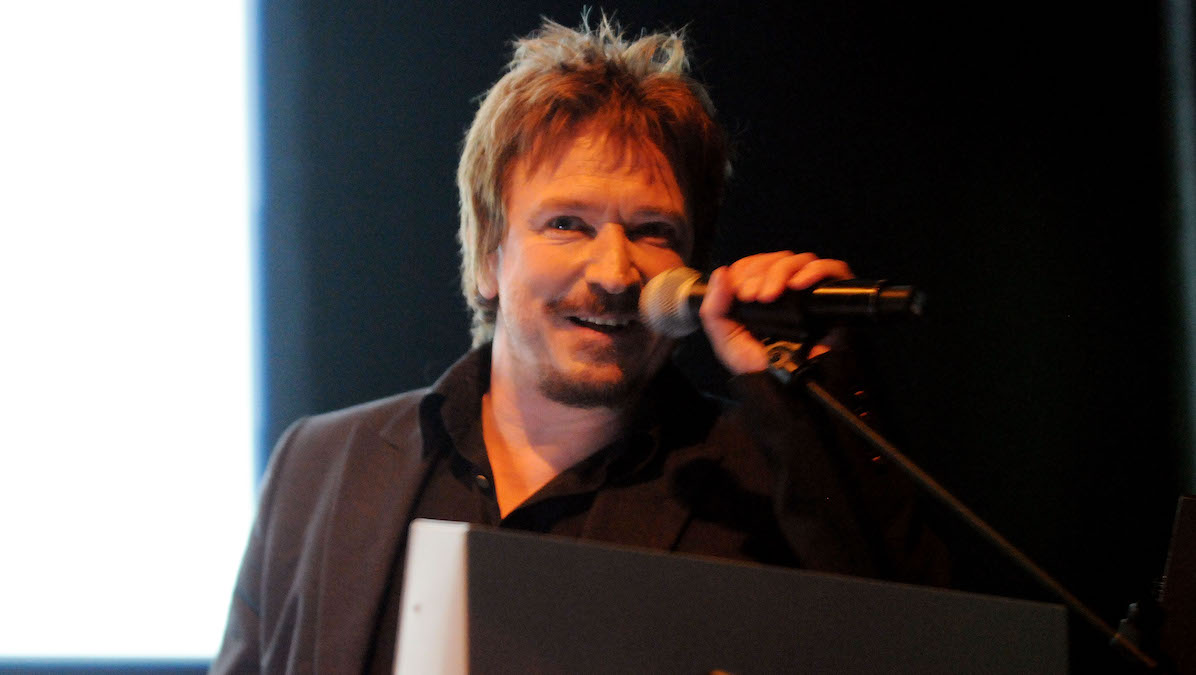
"It started because I wanted to clear out some space," Wilder said in a talk before the auction. "I was looking around thinking, 'well I never play that, or this' or 'this is just sitting here gathering dust', so I thought 'let's offload some of these'.
I was looking around thinking, 'Well, I never play that, or this' or 'This is just sitting here gathering dust'
Alan Wilder
"Then it got much bigger, and I didn't want to have to go through the whole eBay routine of sending packages. I realised I had so much stuff collected over the years. At the end of each tour I would get a bag of t-shirts and tour programs and I kept everything, so I added that in to make it more special.
"I have kept some things myself, some very personal things, like videos I shot on early tours with one of the first video cameras that I would have everywhere with me, plus lots of photographs. It all might see the light of day one day. I've got all the records and kept some of the posters, so I still have plenty!"
"It was quite a pleasurable process. I had to write down every item and research where it came from. I'd get something out of a box and have fantastic memories."
Some of the highlights of the 2011 sale included a Minimoog (used on the albums Construction Time Again and Some Great Reward), ARP Odyssey and Oberheim OB8. There was also an EDP Wasp as used in the famous Aggro Mix of Never Let Me Down Again.
But as iconic as those synths are, potentially more interesting items included Wilder's E-mu Emulator II samplers, the keyboards that he became synonymous with thanks to their heavy use on the band's tours, and in videos such as this one where Wilder revealed more about how they worked.
"What can one say about the Emulator range?" Alan Wilder said in the 2011 auction notes. "Used so much on DM recordings and on stage between 1983 and 1994, they were probably the most versatile of samplers from the 1980s.
We first inserted the floppy disc into the E-mu 1 and listened to the 'Motorbike Idling' sound which became the mainstay rhythm behind Stripped
Alan Wilder
"From the very first Emulator 1, I have used them all and been captivated by sampling technology ever since. I remember when we first inserted the huge floppy disc into the E-mu 1 and listened to the 'Motorbike Idling' sound (which later became the mainstay rhythm behind the [Depeche Mode] song Stripped)."
It wasn't just Wilder's synths and samplers going up for sale at the auction. There was a lot of DM memorabilia available, including gold and silver disks, posters, prints, and, as Alan mentioned, plenty of tour merchandise and old vinyl record pressings.
In fact Alan told Electricity Club before the auction that one of the most unusual pieces for sale would be one of those rare pressings.
"I think that would have to be the unreleased box set known as ‘DMBS 1-4’," he explained. "Thought of as the Holy Grail, these are four extremely rare white labels from a Depeche Mode boxset that was never released. The proposed set was recalled for unknown reasons. Who knows why? The four test pressings were made and sent to me for approval in 1988."
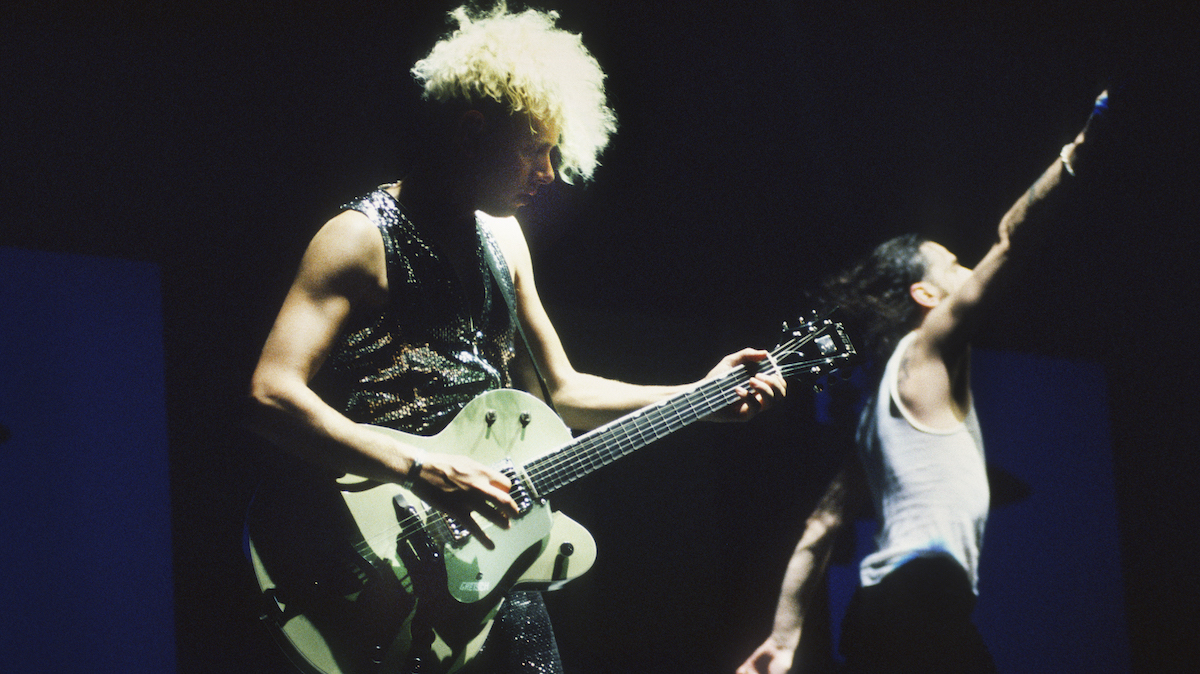
The sale raised a total of £223,205 (well in excess of the £200k estimate), with 417 of the 422 lots sold at an auction with 170 attendees in the room, and 570 online from 33 countries.
The Oberheim OB8 sold for just £1,500 – a bit of a steal – while the Wasp went for an impressive £1,400. There must have been bit of a buzz around that one
A Steinway Model O was the biggest seller at £11,000, but not far behind was a Knight Gretsch Anniversary guitar, as used by Martin Gore on the Mode's World Violation and Devotional tours (see pic above), that sold for £10,400.
An E-mu Emax Turbo II Model 2205 sampler keyboard sold for £6,400, including a set of discs, while an Emulator II sampler sold for £4,200 with a set of over 120 discs.
The Oberheim OB8 sold for just £1,500 – a bit of a steal – while the Wasp went for an impressive £1,400. There must have been bit of a buzz around that one. Sorry.
Of the rest, the aforementioned DMBS 1-4 pressings sold for a whopping £3,500, while individual ZIP discs complete with Wilder samples sold for up to £650 each. Gold and silver discs shifted for up to £1,000 a time, and rare singles and 12" records went for anything up to £600. The cheapest item sold was a rare Recoil 12" for £75.
"We're extremely pleased with the results of the sale and the fantastic feedback received from both those who attended the sale, in some cases having travelled from as far afield as Canada, Russia and across Europe," auctioneer Paul Fairweather said at the time.
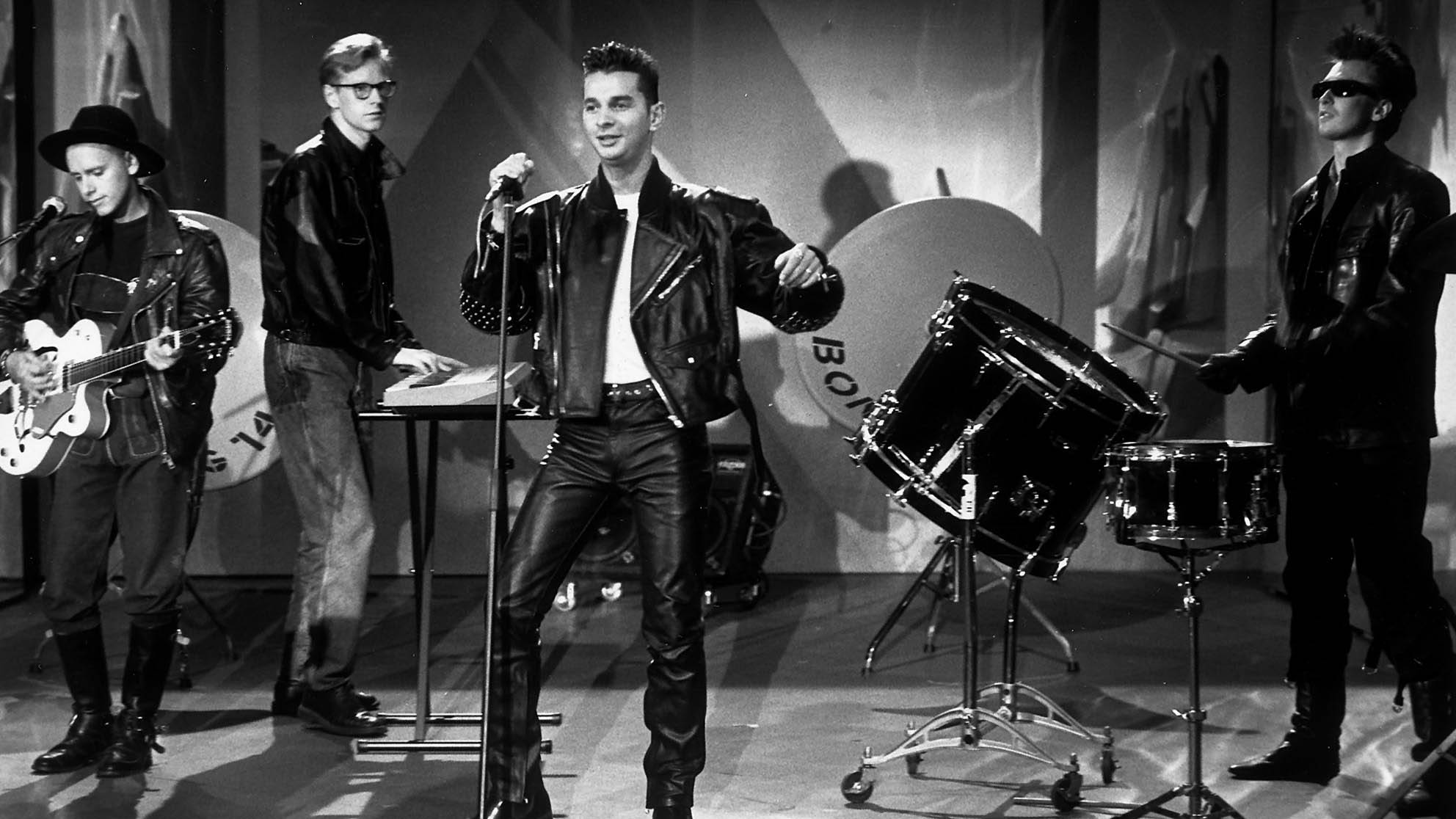
It wasn't the only time Wilder would sell some of his gear. In 2018, a Roland Jupiter-8, one of the synths used on the Depeche single Get the Balance Right and albums Construction Time Again and Some Great Reward, was sold at Bonhams.
I was also the 2nd highest bidder on the EMAX II and I regret it to this day that I didn't go all in
That went for £10,000, which is cheap for a Jupiter-8 these days. In fact if you look at the prices as a whole in the original auction, some people got a steal – the Oberheim synth, especially. That said, the sale did take place more than 12 years ago, and it's only recently that some synth prices (particularly the Jupiter-8) have rocketed.
As to the people who bought the items, it seems most were die-hard fans – we can't find any famous names who picked up some bargains. Some people claimed to have picked up items at the sale in the comments section of the Depeche Mode blogger Vaughn George's video, which came out on the 10-year anniversary of the auction.
One said they bought a MIDI Patch Bay (used live for Personal Jesus), a dual gate, the Roland R-880 Reverb, a the Zoom 9010 FX (with settings for many SOFAD songs), signed posters and a ZIP. They added: "I was also the 2nd highest bidder on the EMAX II and I regret it to this day that I didn't go all in."
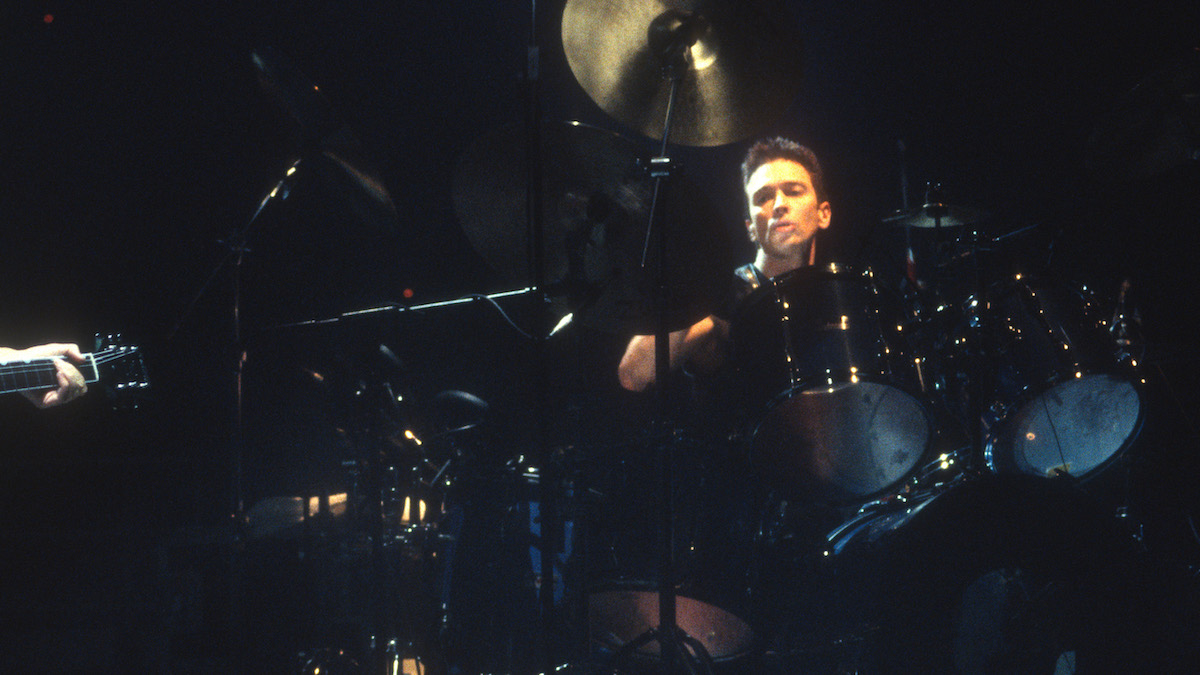
Another said they, "bought the vest that Alan is wearing in the Devotional video", but probably the best comment was from Mario in Switzerland who bought Alan's drum kit, a Yamaha kit used on the Devotional tour (above) that went for £3,300.
Unfortunately I can‘t play it but I love to see it every time I go to bed
"I built it in my bedroom," he said. "[It] was an incredible time when I was chatting with Alan at the auction. Unfortunately I can‘t play it but I love to see it every time I go to bed and imagine the history behind this drum kit."
Kind of makes us wish we'd been there and put a few bids in. That Oberheim had our name on it, dammit…
There's a fantastic set of videos on the Depeche Mode Youtube channel, where Alan talks through a lot of the gear in detail – we particularly like the part where he says he can get rid of a Steinway piano, as he has a spare Bösendorfer. He explains the story behind a lot of the memorabilia, demos some of the gear and goes through a lot of the merch.
Be warned, though, it might make you, like us, wish you had a time machine to get back in that auction room. The first part is below. Click if you dare (and check out that house)…


Andy has been writing about music production and technology for 30 years having started out on Music Technology magazine back in 1992. He has edited the magazines Future Music, Keyboard Review, MusicTech and Computer Music, which he helped launch back in 1998. He owns way too many synthesizers.
